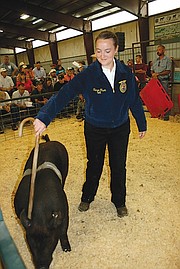Payoff for hard work comes at stock sale
MOSES LAKE - For 10 months, and for dairy cattle, more than double that, 4-H and FFA livestock participants feed, water and work with their animals, hoping to see the payoff when the Grant County Fair rolls around.
Those hopes are either realized or dashed at the stock sale.
The buyers' list for the stock sale included six dairy cows, 46 steers, 214 pigs, 103 lambs, four goats, 23 rabbits and two chickens. The goal is to ensure all of those kids go home with a little money.
Clarissa Hanson, the FFA president at Wilson Creek High School, said she estimated she spent about $1,000 to raise her pig, including her initial purchase, feed and medication, which was more than she anticipated. Before entering the sale ring Clarissa was hoping to sell the pig for $3.25 per pound; she would make money at $3.25 per pound, she said. For the record, she did better than that.
Alexis Pio, a senior at Quincy High School this fall, took out a loan to buy his steer and needed $1.50 per pound to break even. His steer sold for $1.85 per pound; "$1.85, that's pretty good," Pio said. He was considering rolling his profit into another steer, but his FFA advisor suggested an alternative. "You should get your profit and just stack it," Pio said.
Pio plans to buy another steer, starting with a loan. "I'm going to save my profit until I have, a lot," he said.
Cole Scott, a junior at Othello High School, got $1.95 per pound for his steer. "If I heard right. It's tough to hear in there sometimes," he said. The auction "goes by in, like, half a second." Cole said he expects to profit. "I give myself a little bit," $20 here and there, but "I try to keep most of it," he said.
Spencer Cobb, 16, Ephrata, also got $1.85 per pound for his steer. "That's good," he said. He's banking his profit also.
Kyle Trump, 17, Moses Lake, had high expectations for his pig. Kyle's pig made the market finals in FFA competition. Animals and owners are called back for further evaluation, which is why it's called a callback. Under those circumstances "six bucks a pound would be about right for this pig," he said. The animal had lots of muscle tone, which made it desirable in Kyle's opinion. "Lots of good meat," he said.
Not everyone profits every year, but making sure the kids get as much money as possible is the goal of booster clubs and business throughout the Columbia River Basin.
Each sale starts with a floor price, which is based on commercial market conditions, said Aaron Raap, president of the Grant County Cattlemen's Association. Because kids are only raising one animal, or at most a few animals at a time, "it costs them more to bring that steer to the fair," Raap said. Businesses and local booster clubs pitch in to ensure kids do more than break even.
"Every year we just support the kids," said Rich Miller of the Ardell Foundation. Businesses can donate to fair support programs, but Dave Dye of the Crop Production Services office in Coulee City said he tries to bid in person every year. Kids raising livestock usually are working in relative isolation, and in Dye's opinion they need to know people are interested.
"They've got to see your face and they've got to hear you say they did a good job. They've got to hear that from more than just their parents," Dye said. "I think all that's important."
It's very unusual for an animal to go home with the buyer. Normally they are "turned back," or sent for commercial sale. (Every year a commercial packer buys the animals in bulk at the floor price.) In 2012 Paul Klingman-White Trail Hog Farm provided the floor price for pigs, AB Foods-Washington Beef for steers and Bart Fouts for lambs, said Sarah Smith, of WSU-Grant-Adams County Extension.
Dye said he bought one for personal use and the producer gave him a quality product. "The sausage was so lean I could barely make biscuits and gravy," he said.
Bryan DeHoog, dairy barn superintendent, said the idea is to keep kids involved in agriculture. The lessons learned raising cattle and pigs resonate long after kids stop coming to the fair, Smith said. "It's not about today. It's about the decisions they make tomorrow," she said.





